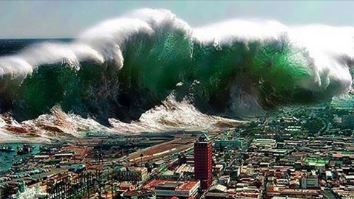Documents and DisastersOctober 29, 2018 The first part of my training to serve as a Firefighter-Paramedic was attending “Fire College.” The most important thing I learned there had nothing to do with fire, and everything to do with human nature. They taught us that every major advancement in the fire service resulted from disasters that could have been prevented. Only after great losses do people tend to make the preparations they knew should have made beforehand. The first part of my training to serve as a Firefighter-Paramedic was attending “Fire College.” The most important thing I learned there had nothing to do with fire, and everything to do with human nature. They taught us that every major advancement in the fire service resulted from disasters that could have been prevented. Only after great losses do people tend to make the preparations they knew should have made beforehand.One tragic example that still stands out in my mind is the Great Chicago Fire. We’ve all heard about the devastating loss of life and property caused by Mrs. O’Leary’s cow. The fire killed 300 people and destroyed 3.3 square miles of the city, which was one-third of the property valuation then. That was $222 Million at the time, which would be $4 Billion today. It left more than 100,000 residents – over one-third of Chicago’s citizens – homeless. Most accounts state that the cow knocked over a lantern in the barn; others claim that some men gambling and drinking in a barn tipped over a lantern. In either case, the city could have done nothing to stop the ignition point of the fire. But much could have been done to stop its disastrous spread. Two-thirds of the buildings in Chicago were of wood frame construction, and most had tar or asphalt shingle roofing – all highly flammable materials. Also, in 1871 the city of 300,000 people had only 185 firefighters and 17 horse-drawn steam engines to protect one of America’s largest cities. Needless to say, following one of the world’s greatest fire catastrophes up to that time, the city made major changes. They enacted much stricter building requirements and beefed up their fire service. These were needed reforms that had been discussed for years. Unfortunately for those who died and lost their homes, the reforms came too late. What types of disasters, natural or man-made has your state experienced in the last ten years? There is probably not one state that has escaped unscathed. It might be natural disasters like floods, hurricanes, tornados, earthquakes, or blizzards. It might be major wildfires like those recently in California caused by careless campers. What’s my point? What if your house or office had been destroyed in such a disaster? How would you have fared with the destruction of your vital documents? FEMA (the Federal Emergency Management Administration) suggests that everyone gather the following and have a safe place to keep them in case of a disaster: • Copies of Driver's license, Passport, Birth certificates, Adoption papers, Social Security cards • Citizenship papers (such as a "green card" or naturalization documents), • Marriage license, Divorce decrees, Child custody papers • Current military ID, Military discharge document (DD Form 214) • Medical and vaccination records for pets along with current photos and ID chip numbers in case you are separated • Homeowners Renters, Flood and Earthquake insurance policies • Auto, Life, Health, Disability and Long-Term Care insurance policies • Have at least the policy number and insurance company contact information for each type of coverage • Real estate deeds of trust and mortgage documents (at least the two-page settlement statement provided by the title company showing the actual cost of the house and purchase expenses) • Rental agreement or lease • Auto, boat, and RV registration and titles • A list of household inventory • Immunization and other medical records • Prescription information (drug name and dosage) • Health insurance identification cards • Physician names and phone numbers • Living Will, DNR, and Powers-of-attorney for health care • Wills, Trusts, and Powers-of-attorney • Funeral instructions • Attorney names and phone numbers • First two pages of your previous year's federal and state tax returns • Stock and bond certificates, and other Investment records • Brokerage and retirement account information • Credit card, Checking and savings account numbers • Contact information for credit unions, banks, financial institutions, credit card companies, and financial advisers • Personal contacts (phone and/or email) • A letter with instructions for family or friends (for use in a situation where you're not present) • A list of usernames and passwords for online accounts • Account and contact information for utilities and other services (you may have to provide a new billing address or cancel certain services) Thanks to the federal government for this long and very comprehensive list of essential documents. But what is the “safe place” where we should store them? Following the process of gathering these documents in one place, I see two choices: 1) Physical storage, such as a safe deposit box. But your bank may be flooded, too. A safe in your home is another possibility. But even a fire-rated safe won’t protect your papers if the fire burns long and hot enough. 2) Or, you could file everything in a digital filing cabinet that has a place for everything on your list and will remind you of anything that’s missing. This filing cabinet is in a digital vault that has bank-level security. If Mrs. O’Leary’s cow, or something else, triggers a disaster in your area, would you rather trust physical storage that may be impacted by the same disaster? Or would you feel safer with a digital vault that can de be accessed from anywhere – even if you have to evacuate? The answer for my family and me is a digital vault, which is available from www.OneSecurePlan for a remarkably affordable fee. You’ll find that the time you put into being prepared will pay for itself many times over in terms of peace of mind. Don’t be like the rancher who closes the barn doors – after the cows get out.
| ||||
 Dr. Tom Barrett is a pastor, teacher, author, conference keynote speaker, professor, certified executive coach, and marketplace minister. His teaching and coaching have blessed both church and business leaders. He has been ordained for over 40 years, and has pastored in seven churches over that time. Today he “pastors pastors” as he oversees ordained and licensed ministers in Florida for his ministerial fellowship. Dr. Tom Barrett is a pastor, teacher, author, conference keynote speaker, professor, certified executive coach, and marketplace minister. His teaching and coaching have blessed both church and business leaders. He has been ordained for over 40 years, and has pastored in seven churches over that time. Today he “pastors pastors” as he oversees ordained and licensed ministers in Florida for his ministerial fellowship.He has written thousands of articles that have been republished in national newspapers and on hundreds of websites, and is a frequent guest on radio and television shows. His weekly Conservative Truth article (which is read by 250,000) offers a unique viewpoint on social, moral and political issues from a Biblical worldview. This has resulted in invitations to speak internationally at churches, conferences, Money Shows, universities, and on TV (including the 700 Club). “Dr. Tom,” as his readers and followers affectionately refer to him, has a passion for teaching, as you can see from his ministry website (www.ChristianFinancialConcepts.com); his patriotic site (www.ConservativeTruth.org); and his business site (www.GoldenArtTreasures.com). Tom's friend Dr. Lance Wallnau wrote of him, "Tom Barrett is a Renaissance man with a passion for subject matter ranging from finance to theology and American history." Visit Dr. Tom Barrett's website at www.DrTom.TV
|
